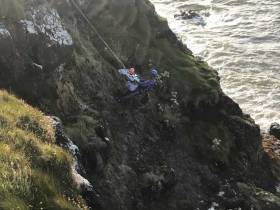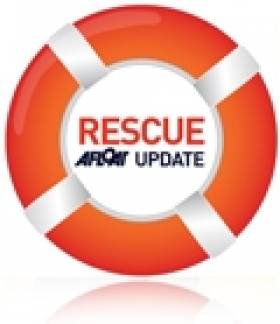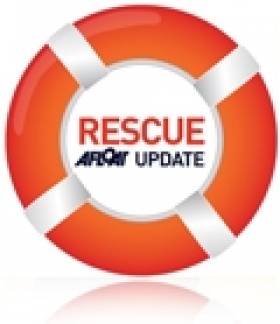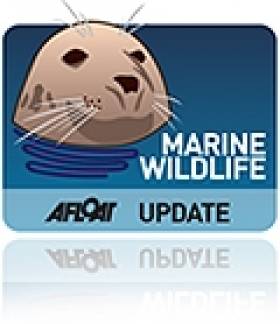Displaying items by tag: Castlerock
Stranded Teen Rescued From North Coast Cliff Base
#Rescue - Coleraine Coastguard rescued a teenage girl who was stranded at the base of a 100ft cliff at Castlerock yesterday evening (Monday 24 July).
The coastguard rescue team was tasked to Castlerock following a report of two girls cut off by the tide, one of whom was reported as having been injured.
Ballycastle Coastguard, both Portrush lifeboats and RNLI lifeguards in the area were also tasked to assist.
The lifeguards managed to locate one teenage girl at the base of the cliff, just below the caravan park.
One lifeguard and one crew member from the inshore lifeboat landed on the rocks to assist the stranded girl, who was by that point hypothermic, distressed and exhausted from having tried to swim to safety.
She had also sustained a number of abrasions from making contact with the rocks.
Although the spring tide was rising rapidly, her condition made a rescue by sea very difficult. It was therefore decided to carry out a rope rescue.
A coastguard rope rescue technician descended the cliff and brought the stranded girl to safety, just as the waves broke over the rocky platform where she was stranded.
The teenager was soon reunited at the cliff top with her parents and with her friend, who had managed to swim to safety and had raised the alarm.
Both girls were taken to hospital by ambulance as a precaution against secondary drowning.
The coastguard later found two teenage boys had been with the girls, sustaining lacerations and abrasions as they tried to cross the rocks towards Castlerock beach.
Earlier in the evening, Coleraine Coastguard was tasked to White Rocks in Portrush where a four-year-old boy had sustained a head injury on the rocks.
On arrival it was found that the RNLI lifeguards on duty had assisted the child and delivered him into the care of the NI Ambulance Service.
RNLI Lifeguards Rescue Man On Castlerock Beach
#RNLI - RNLI lifeguards rescued a man who found himself in difficulty on Castlerock Beach in Co Derry yesterday afternoon (Friday 3 July).
Shortly before 12.30pm, senior lifeguard Damian McCauley was assisting two vehicles that had got stuck in soft sand at the entrance to the beach when he heard a man call from one of the cars and wave for help.
The man, who was on his own in the car, was hunched over, struggling to breathe with his arms shaking, while his voice was hoarse and weak.
McCauley immediately ran for the lifeguard’s first aid responder bag and, using his training, began to deliver casualty care.
Meanwhile, lifeguard Beth Montgomery, who was acting as the communications liaison, alerted the coastguard and the Northern Ireland Ambulance Service.
Lifeguard Conor O’Callaghan ensured the beach, which had about 300 people visiting at the time and with 40 people in the water, remained open by patrolling between the red and yellow flags.
On monitoring the casualty’s breathing, McCauley observed that oxygen was required and, using the RNLI apparatus, proceeded to ensure the man got this. He continued to carry out casualty care while talking to the man for 25 minutes until the other emergency services arrived.
By that time the man had begun to respond to the oxygen and was then transferred from his car to an ambulance and brought to the Causeway Hospital in Coleraine.
Speaking following the rescue, RNLI lifeguard supervisor Tim Doran said: "We would like to wish this gentleman well and hope he makes a speedy recovery following his ordeal this afternoon.
"He managed to raise the alarm quickly when he found himself in difficulty today and thankfully our lifeguards were able to respond immediately and give him the medical attention he needed right away.
"This rescue is testament to the first aid training our lifeguards have and to the equipment we carry on the beaches which ensure we can deliver good casualty care."
Doran added: "Our lifeguards worked well together today to deal with the emergency, liaise with the other emergency services and keep patrol of the remainder of the beach.
"This incident is another example of how our lifeguards' vigilance is as important on the beach dealing with land-based incidents as it is when patrolling incidents that unfold in the water."
#Rescue - Castlerock RNLI lifeguards rescued a family of six after they got into difficulty on the town’s seaside beach in Co Derry yesterday (7 July).
Senior RNLI lifeguard Gordon Clark was patrolling busy Castlerock beach when at he noticed a person in the water waving for help a short distance to the right of the flagged zone on the beach around 5.30pm.
The family of six – including a man, woman and four children – were all on bodyboards when they got caught in what appeared to be a flash rip, a strong current running out to sea.
After radioing for assistance, Clark swiftly entered the sea with a rescue tube. He was quickly joined in the rescue operation by his RNLI lifeguard colleagues Jenny Thompson and Ray Cunningham.
Clark and Thompson proceeded to safely ferry the children, followed by their parents, to the shore, where they were checked over to ensure they hadn’t taken on any water. All were safe and well.
Speaking following the rescue, Mike Grocott, RNLI lifeguard manager for Northern Ireland, said: "Rip currents often catch people out because they can be difficult to spot, and research shows that most people don’t know how to identify one. They are a major cause of incidents that the RNLI’s lifeguards deal with each season.
"Anyone who gets caught in a rip should try to remain calm, raise their arm in the air to signal for help like the family member did today. If they feel they can swim, they should swim parallel to the beach until free of the current, and then head for shore."
With temperatures expected to soar this week, Grocott reminded people to be mindful of the RNLI’s key safety recommendations – choose a lifeguarded beach and swim between the red and yellow flags, which mark the safest area to swim and are an indicator that lifeguards are on duty.
NI Seal Death Prompts Investigation
#MARINE WILDLIFE - An investigation is underway to determine the cause of death of a seal found on a Derry beach this week.
As UTV News reports, the seal was found on Castlerock strand on Wednesday afternoon, and local reports suggest it suffered a gunshot wound to the head.
In a statement, the Northern Ireland Environment Agency (NIEA) confirmed that the carcass had been removed for a postmortem to determine the cause of death, and that the PSNI has also been made aware of the matter.
As previously reported on Afloat.ie, the Dingle Seal Sanctuary commented on what it saw as a "swing in activity" in illegal seal killings around Ireland earlier this year - following a shocking incident at the sanctuary in June.
Meanwhile, Northern Ireland's Green Party warned in March that "rogue" anglers in Co Down may shoot seals they accused of consuming their fish stocks, after the protected marine wildlife managed to enter a section of the River Quoile.



























































